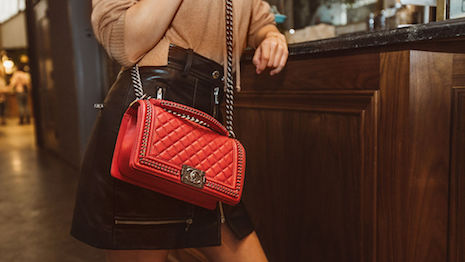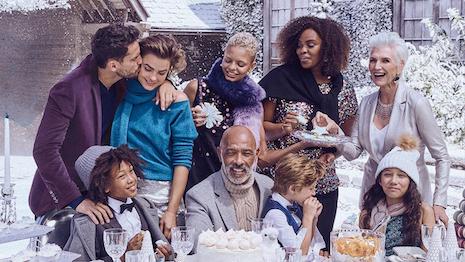 Burberry's 2018 holiday campaign. Image credit: Burberry
Burberry's 2018 holiday campaign. Image credit: Burberry
More than a third of affluents in the United Kingdom and United States plan to spend more this holiday season than last year.
According to a new report from Altiant, 60 percent of high-net-worth individuals associate particular luxury brands with Christmas. Hard and soft luxury goods are the most in-demand gifts, with Gucci and Chanel items being the most popular in both countries.
"Generally, there is strong confidence in the market with 34 percent of affluent respondents spending more for Christmas this year than they did in 2017," said Meryam Schneider, vice president of marketing and partnerships at Altiant. "U.S. respondents are slightly more optimistic with 37 percent spending more versus 34 percent in the United Kingdom.
"This difference is also re-enforced by the 10 percent of British respondents planning to cut expenses compared to only 7 percent in the United States," she said.
Altiant interviewed 200 affluents from each the U.K. and U.S., with 55 percent of respondents between ages 18 and 45 and 45 percent over the age of 45. The average household income was 391,220 pounds in the U.K. and $932,282 in the U.S.
Holiday plans
Thirty-four percent of respondents from both countries expect to spend more this Christmas season.
A third of wealthy Americans will spend more than $1,250 on their partners’ gifts, compared to only 23 percent of Britons who plan to spend more than 1,000 pounds on their significant others. British respondents are significantly more likely to spend less than 250 pounds, or $300, on their parents, children and in-laws.
Chanel items and luxury handbags are both on many affluents' shopping lists. Image courtesy of Tulerie
American affluents are more likely than their British counterparts to gift luxury handbags, fashion and footwear, but electronics are the most popular gift category overall and was cited by 65 percent of all respondents. Fragrances and jewelry, including watches, were popular with 62 and 61 percent of respondents, respectively.
Two in five affluents are giving a leisure gift, such as a hotel stay or spa experience. Despite the proliferation of holiday campaigns from automakers, transportation is the least popular gift at 10 percent.
As for gift recipients, 40 percent of respondents admitted they have a particular luxury gift on their wishlist.
Almost 150 brands were mentioned by affluent consumers, but Gucci and Chanel led the way with each label being mentioned 12 percent of the time. Tiffany and Louis Vuitton followed at 8 percent, and Moët & Chandon was the most-mentioned luxury beverage maker.
Affluents tend to stay close to home and family during the holidays. Image credit: Macy's
Holiday traditions remain of great importance to affluents, and luxury marketers would be wise to continue emphasizing tradition in future holiday campaigns.
Eighty-three percent report they will have a traditional Christmas dinner, the majority of whom will be cooking the meal themselves or with family, and 64 percent will spend the day with their immediate family. Only 10 percent will be spending the holiday traveling abroad, while 83 percent will stay at home or travel to an extended family member’s home.
Last year, German automaker Mercedes-Benz emphasized the futuristic characteristics of its EQ concept by contrasting the model with never-changing holiday traditions.
In a new vignette to celebrate the holidays and its electric-powered concept vehicle, Mercedes is enticing consumers to look for something different. As the world around us changes, consumers' Christmas traditions will likely stay the same (see story).
Shopping in-store
Affluents rely on both physical and ecommerce stores to complete their holiday shopping, with 43 percent of respondents estimating they do about half of their shopping in-store and the other half online, according to Altiant.
New research from KPMG shows that nearly 70 percent of consumers still had up to half of their holiday shopping left to do in the final week before Christmas. The majority of these last-minute shoppers will complete their purchases through a mixture of online and in-store purchases, calling for cross-channel retail strategies that minimize friction.
Only 15 percent of shoppers will finish their shopping entirely online, while 59 percent will do their last-minute shopping between online and in-store (see story).
Department stores have spent the holiday season ramping up marketing and customer service efforts to attract high spenders to their stores.
Nordstrom is working with a new wholesale buying platform to help reduce manual labor in terms of the buying process, so that Nordstrom team members can focus on picking the right products for their store.
The retailer has also ramped up its customer service offerings for the upcoming holiday season with an influx of new hires. During a company-wide hiring day in October, all store locations across the United States and Canada participated in hiring new employees for its bricks-and-mortar locations, call centers and distribution and fulfillment centers (see story).
"For luxury brands it is important to consider the Christmas celebrations as an experience or a series of experiences that fall into the Christmas ecosystem," Ms. Schneider said. "The quest for a strong omnichannel strategy for luxury brands should be even stronger in this period of high spend considering that 43 percent of our U.K. and U.S. affluent consumers claim to be doing half of their shopping online and half in stores."

